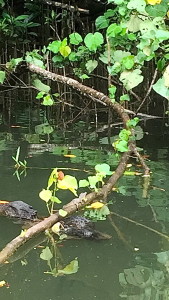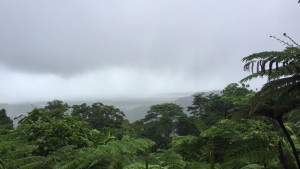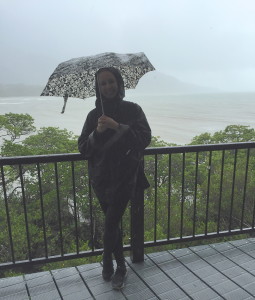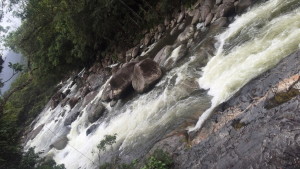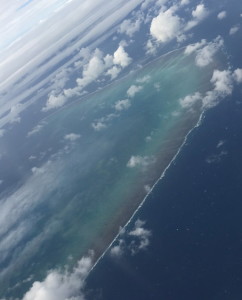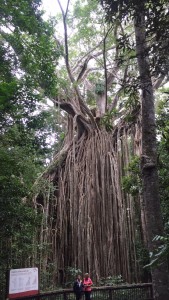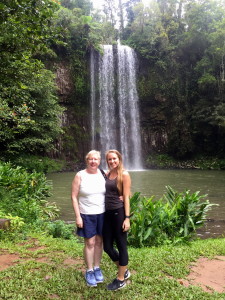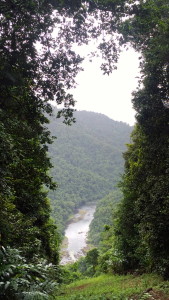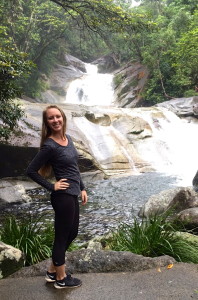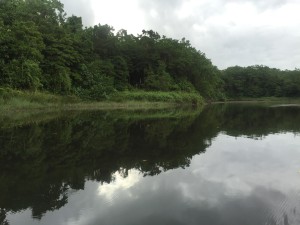Today I got to check off another major life bucket list item, visiting the iconic Great Barrier Reef!
Based on square meters, the Great Barrier Reef is the most diverse ecosystem in the world. The reef is located about an hour and a half off of the coastline, and is made up of coral cays, which are essentially semi circles of reef formations, with the more built up areas on the southern side. As the currents push water and sand south, it builds up into these formations. The reef has over 2,900 reef cays, and stretches over 1,400 miles of the Coral Sea. This area is so large that it is the only living thing on planet Earth that can be seen from outer space, and is the world’s largest single structure made by living organisms. It is categorized as one of the seven natural wonders of the world. Combined with the Whitsunday Islands, it generates $3 billion of tourism revenue per year.
Unfortunately, human activity on the reefs has drastically impacted the health of the ecosystem. The coast of downtown Cairns is essentially a contaminated mud flat where boats dock, leaving a not so attractive view. However, the reef protects the ocean closer to land, therefore providing a natural barrier, which makes the water relatively calm. Unfortunately the windy and rainy weather the past few days has made the visibility in the water not very good, but there is also a problem with coral bleaching. Tragically, over 50% of the reef has already been killed off, so it is extremely important to make sure products being used are environmentally friendly.
Snorkel Trip One
To explore the reef, we took a 60-person tour with Ocean Freedom. The crew was extremely knowledgeable, very friendly, and helpful. After our boat ride out, we docked and went for a half hour snorkel. Although visibility was low, we still were able to see a lot of wildlife! Our first friend was a barracuda over a meter long that likes to hang out around the back of boat (according to the staff). Although this wasn’t particularly my favorite sighting, it was still a story that I survived to tell! We also saw sea turtles, which are gorgeous and impressive creatures. One of our guides explained to us that most wildlife on the reef gets their name because it literally looks like what it’s named after. For example, brain coral looks like a brain, and boulder coral looks like a boulder. To follow this story, I saw a unique fish that was yellow with black dots, and was shaped sort of like a box. When I later looked it up, it was in fact called a “yellow box fish,” creative! I also saw a humphead wrasse fish, which is basically a large dark-colored fish with a bump-like structure on its head. I didn’t know what it was at the time, but it was massive, probably about three feet long!
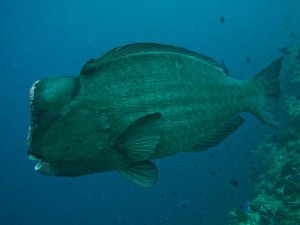
Bumphead Wrasse (picture from http://www.swissnomads.com/2014/09/best-dive-sites-lhaviyani-atoll-maldives/)
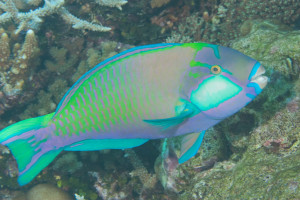
Parrotfish (picture from https://phishdoc.com/2015/09/14/parrotfish-i/)
One of my favorite fish was the parrotfish, which males are a rainbow of colors, and females are beige and brown. They are absolutely beautiful, but also contribute to a large portion of bioerosion on the reefs. They consume microscopic organisms that live on an in coral rock by using their beak-like teeth, and in the process destroy the coral. This natural devastation of the reef actually accounts for a large portion of the ecological loss. Parrotfish also do this cool thing at night where they spit out a large cocoon of balloon-like skin, which they swim inside of it and sleep there for the night. The properties of this sticky skin make it so that other sea creatures cannot sense its presence by its electrical impulses. If a predator were to attempt to break this casing, it would be repelled my the thickness and stickiness of it. Our tour guide said he was once on a dive where a friend picked up the bubble with the parrotfish asleep inside, and it didn’t even wake up!
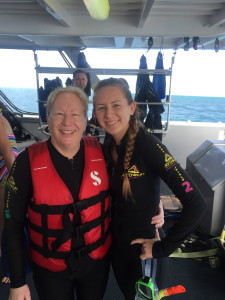
My mom and I before snorkeling
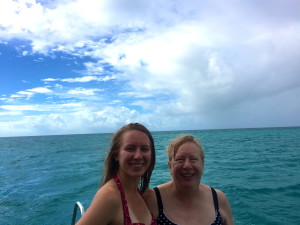
My mom and I post snorkeling
Glass Bottom Boat
Next I took two back to back trips in the glass bottom boat, because you never know what you’re going to find in the big blue sea at any given moment! We saw countless sea cucumbers and blue starfish, and got briefed on many different types of coral and fish. After returning to the boat, we enjoyed a fabulous lunch, then headed to the second snorkeling location. This was just a short distance away, on the other side of the cay. Marine life there was about the same as the previous location, but it was great to see two different areas on the same trip.
Snorkel Trip Two
Since there was more of a current in this area, we took the smaller boat out ahead of the cruise boat, then jumped into the water and followed the current back to the main boat. A staff member swam with us, teaching us about various ocean facts. She also led us to a sort of coral cave where there were often sharks. Lucky for us, they were hiding out there! You had to dive down a little and look under a ledge, but we did get to see a few incredible black-tipped sharks. About the only “big” thing we didn’t see was a manta ray. Small blue-spotted rays are very common in the sandier areas where we were, I just didn’t happen to see any. I also got to see my other favorite fish, nemo’s! Or, “clownfish,” if you want to be technical. They are definitely the other most adorable thing I’ve see in Cairns, in addition to the aforementioned baby crocodiles. Despite the cloudiness of the water and roughness of the waves, we were able to see quite a satisfying amount of ocean life!
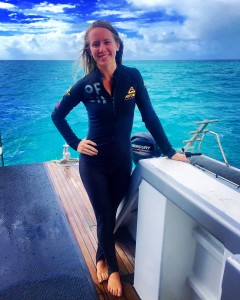
Enjoying the Great Barrier Reef
Tour Advice
Overall, I would say that our tour was extremely successful! If you are looking for what tour to do here, I would recommend Ocean Freedom for several reasons. Their company is one of the few family-owned businesses left, and they truly do act like a family. All staff was very well educated, and everything on the boat was clean and organized. Their was plenty of food throughout the day and it was always good, and staff was quite accommodating. I didn’t bring along any sort of underwater camera, but if you have one, bring it! When the water is clear, the footage is great, especially with a mounted GoPro. However, if the water quality isn’t very clear, you’re honestly better just enjoying the trip and not bothering with trying to get decent photos. If you get seasick or motion sick easily, and find yourself here during rough weather, definitely take something prior to heading on the boat. Additionally, when the weather is more rough, snorkeling in the ocean is also a little more difficult that you may imagine. Pretty much anyone can do it (they even will personally take you out with a life guard ring and guide if you’re elderly etc), but you do need to be aware of strong currents and larger waves. It’s a little different than snorkeling in calm water, but far worth it! If you are nervous about trying it out, there’s a huge scale of beginner to advanced options, so definitely go for it!
Cairns
After docking at the marina, we walked to the lagoon pool and took a few photos in the beautiful infinity pool built right on the beach. Cairns has fun things like giant stinging jellyfish and plankton that don’t hurt you but make your skin tingle, so the lagoon is a great option for when these creatures are in season! We got back around dinnertime, still feeling somewhat like we were on a boat, and had a relaxed evening. Cairns still gives me a slightly weird feeling that I haven’t gotten anywhere else in Australia, I am 100% glad to have come and that I was able to do everything on my Cairns bucket list! However, I think if I come back for this sort of trip, I will try somewhere new, like farther up North (where snorkeling is supposedly even better), the Whitsunday Islands, or Fiji. Tomorrow we will head to the airport in preparation for Melbourne and the Great Ocean Road!

Cairns boardwalk


